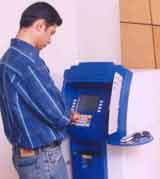Article
Tailor-made ATM
NCR's Asan, a new ATM model introduced late last year, was developed especially to solve some of the special needs of India's burgeoning self-service financial market.
July 22, 2004
In an increasingly global economy, does it make sense for a company to modify its products to better fit the needs of a specific region?
NCR,the world's leading ATM manufacturer, has concluded that sometimes it does -- especially in large and relatively untapped markets like India.
Late last year, NCR introduced Asan, an ATM developed with the input of Indian financial institutions and the Indian Institute of Technology at Mumbai's Industrial Design Center.
Bob Tramontano, vice president of marketing for NCR's Financial Solutions division, said that while affluent consumers in large Indian cities have been relatively quick to adopt ATMs, residents of more remote parts of the country have not -- at least partly because FIs have not installed many ATMs in these outlying areas.
"There's a big technology gap there," he said.
Regional woes
NCR conducted focus groups and found that FIs interested in expanding their networks faced some region-specific challenges, including a hot and dusty environment, a limited telecommunications infrastructure and frequent power outages. They wanted a machine that could be deployed quickly and easily and had a low cost of ownership.
 |
NCR's Asan ATM, developed specifically for the Indian market. |
NCR spent more than a year developing a machine designed to meet these challenges. Based on its EasyPoint 55 platform, Asan features what NCR calls an Intelligent Power Management System, with an integrated uninterrupted power supply that allows ATMs to complete ongoing transactions before shutting down in case of a power failure. The system can also shut ATMs on or off at pre-decided times in areas where 24-hour availability is not needed.
Asan also supports wireless connectivity through GPRS and CDMA communication technologies for areas with poor landline connectivity options. It has a balanced pressure system and enhanced dust filtration mechanism to facilitate non-air-conditioned installations in India's sometimes steamy temperatures.
Bringing ATMs to the masses
These features, combined with a relatively low price point, should help make it more feasible for Indian FIs to bring more ATMs to the masses, Tramontano said.
In a survey conducted for NCR by International Data Corporation (IDC) earlier this year, Indian respondents rated the importance of ATMs in deciding to open a bank account between 4.4 and 4.8 on a 5-point scale. Even among ATM non-users or infrequent users, 44 percent considered ATMs a very important service.
The survey also revealed that respondents considered the number of ATMs inadequate, with nearly 12 percent citing it as an important problem. Eighteen percent of non-users said more ATMs would be an important motivator for usage.
ATM/debit card usage is growing in India. According to a report in the Business Standard which cited card trade publication the Nilson Report, transactions made with both debit and credit cards in India grew 103 percent, to $4.2 billion in 2002, with debit accounting for $3.5 billion of the total. About 95 percent of debit card transactions are ATM cash withdrawals, according to another Business Standard report.
Asan is manufactured at NCR's manufacturing facility in Pondicherry, which was opened in late 2002 as part of a $6 million investment in the region's financial self-service market, one of the world's fastest-growing. According to NCR, the number of ATMs in India has increased from just 500 in 1998 to some 10,000 today.
There is room for plenty of continued growth; India's number of ATMs per million people, at 11, is one of the lowest in the world.
The early reception for Asan has been good, Tramontano said. Several FIs are currently involved in pilots and others, including Cosmos Cooperative Bank Limited, in rollout. Earlier this year, Asan was named the winner in the Self-Service Technology category of the technology awards sponsored by The Banker magazine.
While NCR will "not go hog wild" making different products for different corners of the globe, Tramontano said, it's a safe bet that "you'll see NCR personalizing its products in countries where there is a good market opportunity."













